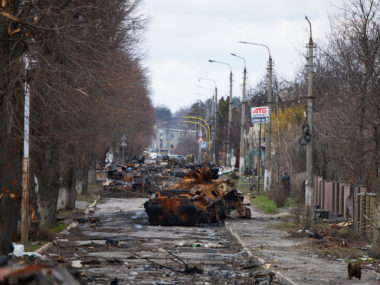Guest post by Belgin San-Akca
In upcoming years, one of the most – if not the most – significant challenges facing democratic nation-states and their project of perpetual peace through economic, social, and political interdependence will be terrorism instigated by non-state armed groups that have territorial and political demands. Take, for instance, the recent debates revolving around the United Kingdom’s plan to hold a referendum on the future of Britain’s EU Membership. Although not the only issue spelled out by UK representatives, the EU’s policy with respect to migration, influx of refugees and terrorism seems to dominate the ongoing bargaining among European leaders.
The outpouring of support from around Europe in wake of the Paris attacks of November 2015 foretold a shift in public opinion towards tighter migration and border control policies. The uncovering of the stories with respect to free movement of terrorists in European countries, such as Belgium, and the ease by which they were conveniently able to plan and coordinate these attacks from within Europe further exacerbated such opinion shifts. Such developments demonstrate the need to refocus our attention on the institutional factors embedded in democracies that facilitate terrorism.
There is ample scholarly research on the relationship between democracy and terrorism, although there is little agreement on its nature. Some scholars argue that democracy discourages terrorism by reducing the appeal of violence as a means to pursue political objectives and providing a political environment in which unwanted rulers can be toppled by free and fair elections and social change can be achieved via the ballot box. On the other hand, some argue that democracy encourages terrorism. Multiparty democracies and democracies going through political transformation are more likely to fall victim to terrorism. Furthermore, the free environment in democracies encourages excluded groups to seek further liberty by resorting to violence. Democracies create incentives for inter-group competition, thus encouraging violence in addition to reducing the cost of terrorist activity via constraints on the executive branch’s ability to take counterterrorism measures. There seems to emerge a scholarly consensus that democracies have weak spots and are easily exploited by terrorists.
Most of the existing research – relying on empirical testing on the same dataset – focuses on transnational incidents of terrorism and whether democracies are targeted more frequently by terrorists than autocratic political systems. But what about terrorism that occurs within the borders of other states? Recent attacks in Paris revealed terrorists functioning within a broad network across Europe. In a recent article, which appeared in the Journal of Conflict Resolution, I focus on such a dilemma of democracy by developing a theory about the exploitation of democracies by terrorists and empirically testing newly collected data on state supporters of non-state armed groups. The theory of terrorist exploitation of democracies identifies yet another causal mechanism through which democracy encourages terrorism: passive support of terrorists, which emerges due to the intrinsic liberal values embedded within democratic systems, which are vulnerable to terrorists who end up raising funds, recruiting, acquiring weapons, and organizing freely. Support in itself implies ‘‘intentionality”; however, a state can also end up supporting a terrorist group because it falls short of taking necessary precautions to prevent such groups from crossing their borders and operating freely within the country. In the case of democracies, this is often the case due to institutional and political constraints that are built in democratic systems. Hasan di Tiro – the leader of the Free Aceh Movement (GAM) – lived in Sweden for many years, taking advantage of the right of asylum often granted by democracies to individuals facing social, economic, or political discrimination, before he returned to Aceh in 2008. The Liberation Tigers of Tamil Eelam (LTTE) had operated an office from London for almost two decades before the British government banned the organization with a newly enforced antiterrorism law passed in March 2001. These are examples that institutional constraints embodied in democratic systems make it difficult to pass laws to constrain the free movement of such groups within their borders. In addition, democracies also enter into a tacit agreement with terrorists. The value attributed to human life in democracies pushes them to turn a blind eye to terrorists’ activities within their borders as long as they do not hurt their citizens.
The empirical findings indicate that democracies are more likely to end up as passive supporters of terrorism rather than providing intentional support to such groups. Additionally, democratic states are less likely to intentionally support terrorists targeting other democracies. Considering that support for terrorism against another state is an act of animosity, democratic peace mechanisms seem to work when it comes to dissuading state support of terrorism. Though democratic states are less likely to provide safe havens to members of terrorist groups, the factors mentioned above often encourage leaders of terrorist organizations to choose democratic states as safe havens. Furthermore, if a terrorist group’s target is a democratic state, its leader is less likely to seek external safe haven.
While one should keep in mind that terrorists easily exploit democracies, this does not mean that states and societies should be discouraged from adopting democratic regimes. The empirical findings indicate that democracies are less likely to provide intentional support to rebels even if they end up occasionally facilitating the operations of some groups. New research shows that rebel groups are able to acquire direct support from democracies in the form of funds, weapons, logistics, equipment, safe havens, training, and troops only 21% of the time. On the contrary, these groups receive support from authoritarian states 79% of the time. Thus, findings suggest that democracy is still the most effective governance system in the fight against terrorism.
Belgin San-Akca is Assistant Professor in the Department of International Relations at Koc University, Istanbul.








2 comments
I agree with this article. Sadly, those in power believe that there is more profit in conflict and war than in peace and cooperation. Peace and cooperation are necessary to get at the root causes of terrorism, military response simply hardens the opinions of all involved and no progress can be made.